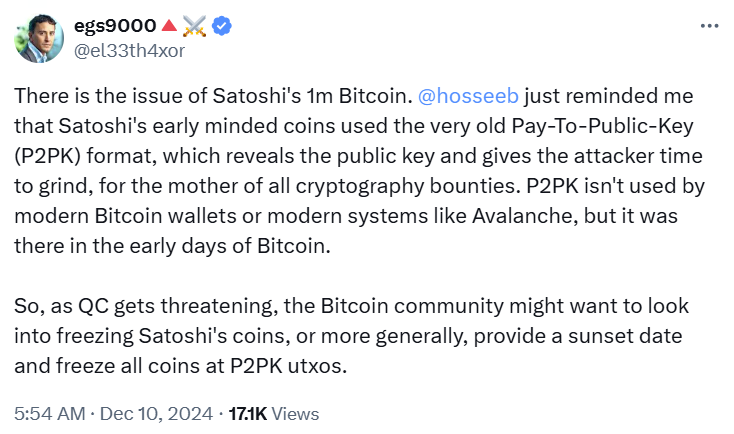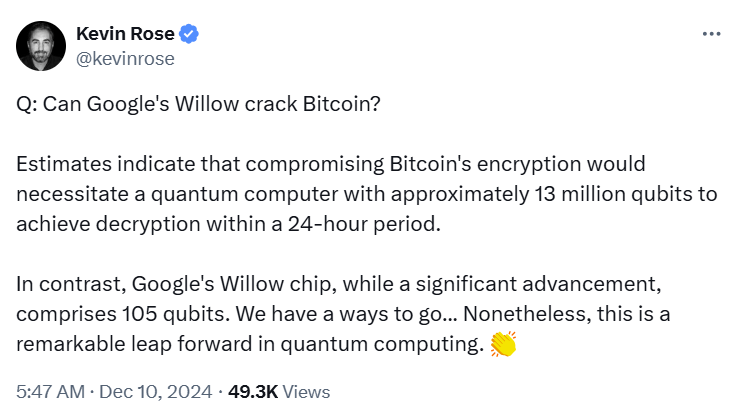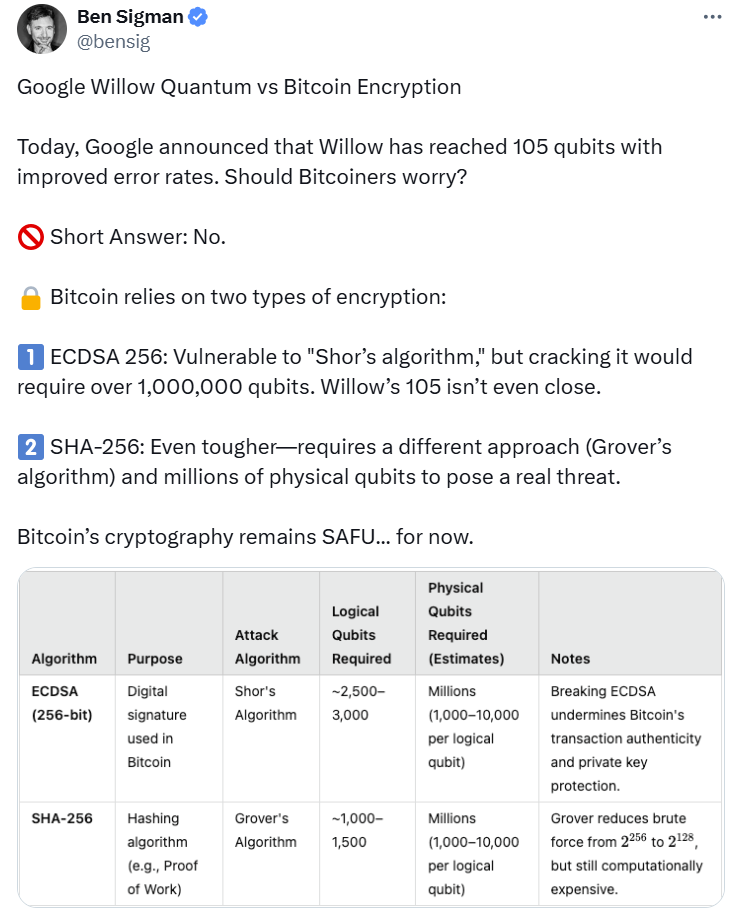Key Takeaways
- Ava Labs co-founder highlighted the vulnerability of early Bitcoin holdings to quantum computing attacks.
- Current quantum computing capabilities do not yet pose a threat to Bitcoin’s security.
Google’s new quantum computing chip Willow has sparked fresh concerns about Bitcoin’s security. As quantum computing advances, it could become powerful enough to crack the encryption of coins held by Satoshi Nakamoto, according to Ava Labs co-founder Emin Gün Sirer.

Sirer warned that early Bitcoin holdings stored in Pay-to-Public-Key (P2PK) format could be vulnerable to quantum computing attacks. To mitigate this potential threat, Sirer proposed two solutions: freezing Satoshi’s coins or setting a sunset date for P2PK transactions.
In a previous statement, Sirer, however, stated that current quantum developments don’t pose an immediate threat.
According to him, crypto assets like Bitcoin and Avalanche use a technique where public keys are only revealed for a short time during a transaction. This means that a quantum attacker would have a limited window of opportunity to exploit a vulnerability.
“Quantum computing will make it easier to perform certain operations, like factoring numbers, while others, such as inverting one-way hash functions, remain just as difficult. Further, depending on the platform, a quantum computer has a small window of opportunity to attack. These two facts make the job of a quantum attacker fairly difficult,” he said.
Is quantum leap the looming threat to crypto?
Quantum technologies have long raised concerns about their potential impact on encryption. Last August, Bloomberg issued a report discussing how quantum computers could potentially break current cryptographic protocols, including those powered by the blockchain.
The report pointed out the potential impact of quantum computing on crypto mining. It warned that quantum computers could dominate the mining process, leading to centralization and security vulnerabilities. They could also decrypt private keys, enabling attackers to steal cryptocurrency assets.
“Although not an immediate threat, quantum computers could soon pose significant and material risks to this burgeoning and resilient asset class,” the report wrote. “There may be certain circumstances where various entities, including asset managers and public companies, may want to consider publicly disclosing the impact quantum computers could have on cryptocurrency investments or investment strategies involving cryptocurrencies.”
Google’s introduction of the Willow chip has stirred controversy about the accelerating timeline for when quantum computers could potentially break existing cryptographic methods.
The fear is that as quantum technology matures, it will become increasingly capable of undermining the security frameworks that protect Bitcoin and other crypto assets
The crypto community has reacted strongly to Willow’s release, with many expressing fears about the implications for Bitcoin’s security.
Some members warn that if quantum computers like Willow can achieve advancements, they could eventually crack the encryption protecting Bitcoin wallets and transactions, putting trillions of dollars in cryptocurrency assets at risk
“$3.6 trillion of cryptocurrency assets are, or soon will be, vulnerable to hacking by quantum computers,” wrote a community member.
“My fringe theory is that #Bitcoin will eventually be hacked, causing it to become worthless,” said AJ Manaseer, manager of RE PE investment funds. “This new quantum chip did in 5 minutes what supercomputers today would take 10^25 years to accomplish. What does that kind of computing power do to cryptography? It kills it.”
Although quantum computing is progressing quickly, many say it isn’t yet at the point of posing a serious threat to Bitcoin’s security.

Experts have argued that breaking ECDSA 256 and SHA-256, two types of Bitcoin encryption, would require a quantum computer with millions of qubits, which Willow lacks.

Source: https://cryptobriefing.com/satoshi-bitcoin-quantum-computing-threat/